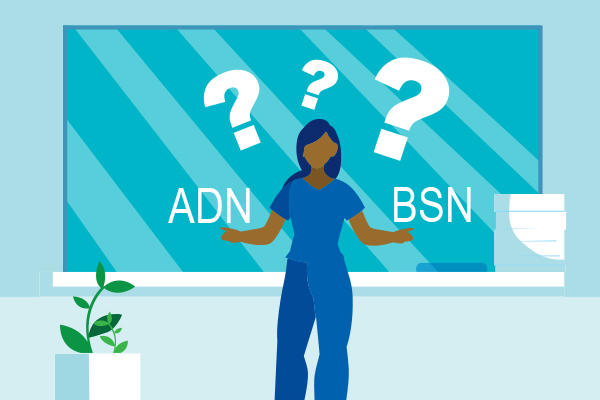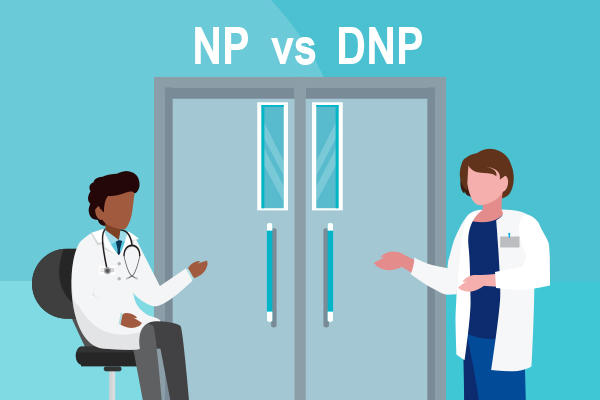Featured
Tags
Share
- Home / Blog / Nursing Today / ADN vs. BSN: Explore the Difference Between ADN and BSN Nursing Degrees
ADN vs. BSN: Explore the Difference Between ADN and BSN Nursing Degrees

The signs pointing you towards a career in nursing seem to be everywhere – from a strong job outlook, to the profession’s high ratings for ethics, to the ability to make a difference in the health of your community in a meaningful way. So, where do you start?
To become a registered nurse, you will need to meet educational requirements and pass the NCLEX-RN® Exam. Two of the most common educational pathways to become a registered nurse are an ADN or BSN degree. In this post, we’ll explore the difference between ADN and BSN nursing degrees, and what factors you should consider when deciding on ADN vs BSN, or ASN vs BSN program options.
What is an ADN?
ADN stands for an associate’s degree in nursing. While the ADN is most common, you could also earn an Associate of Science Degree in Nursing (ASN) or an Associate of Applied Science in Nursing (AAS). An ADN degree can typically be earned in 18-24 months.
What is a BSN?
BSN stands for a bachelor’s degree in nursing. If you’re not yet a registered nurse, you can earn your BSN online, in a campus setting or a hybrid in 3-4 years (or sooner if you have transfer credits). Registered nurses who originally earned their associate’s degree can also earn a BSN through an RN to BSN degree completion option.
ADN and BSN degrees do share some common ground. Both programs will prepare you to sit for the NCLEX-RN® Exam and to practice nursing in a clinical setting. You will also learn the basic communication and medical skills you need for clinical practice.
One immediate difference between ADN and BSN programs that you might notice is the time it takes to earn each degree. When weighing ADN vs. BSN pros and cons, you might wonder why someone would choose the longer option. There are several important factors to take into account during this decision.
ADN or BSN: Which Should I Choose?
When considering ADN vs. BSN nursing programs, you’ll need to think about both where you are now and what you can take on, and also where you want to go in the future with your nursing career. Consider these factors that might influence the ADN vs BSN decision:
1. Curriculum Focus
Whether you attend an ADN or BSN program, you will learn basic nursing competencies and complete clinicals to give you hands-on experience. The difference in ADN vs BSN competencies is rooted in the depth of the curriculum of these programs. Additional courses in a BSN program, like “Collaborative Healthcare,” deepen and broaden your perspective and skills to enhance your practice as a nurse.
Even the most experienced nurses tend to gain greater confidence in their practice when earning their BSN degrees later in their careers – broadening their perspectives, strengthening their skills and gaining new insights into subjects like evidence-based practice.
“I thought I knew all there was to know about assessments until I took my health assessment class at Chamberlain,” said RN to BSN graduate Jessica Wilkins, who earned her BSN after 20 years as a nurse with an associate’s degree. “That class really made me look at the patient more holistically.”
2. Future Career Goals
Do you hope to stay at the bedside for your nursing career, or could you see yourself taking on a role in leadership, as an advanced practice nurse or nurse educator, for instance? If it’s the latter, a BSN degree may better prepare you to advance your education and take on leadership roles in the future.
3. Research on Patient Outcomes
Multiple studies cited by the American Association of Colleges of Nursing (AACN) have found a higher proportion of bachelor’s prepared nurses in the hospital setting was associated with positive patient outcomes including a decrease in the risk of death and failure to rescue for patients.
4. Industry Recommendations & Emerging Legislation
The AACN points to this research as the basis for their recommendation that registered nurses should be prepared with a BSN from an accredited college or university, at a minimum. Likewise, the Institute of Medicine (now the National Academy of Medicine) advocated for 80% of the RN workforce to be prepared at the bachelor’s level by 2020 in their landmark report “The Future of Nursing: Leading Change, Advancing Health.”
The state of New York has also adopted legislation, known as “BSN in 10,” that requires ADN nurses to earn their bachelor’s within 10 years of obtaining their RN license to maintain their licensure.
5. Employer Preference
All of these trends may be influencing a preference for hiring BSN-prepared nurses. In August 2020, the AACN surveyed nursing schools to see if employers had an ADN vs BSN preference when hiring new nurses. Based on responses from 647 schools, the survey found that “41.1% of hospitals and other healthcare settings are requiring new hires to have a bachelor’s degree in nursing, while 82.4% of employers are expressing a strong preference for BSN program graduates.”
If a hospital is seeking Magnet designation through the American Nurses Credentialling Center (ANCC), they will also need to demonstrate that 100% of nurse managers hold a bachelor’s degree or higher.
6. NCLEX-RN® Pass Rates
The National Council of State Boards of Nursing (NCSBN) reports annually on NCLEX-RN® first-time pass rates for ADN vs BSN degree holders. Over the past 10 years, test-takers who earned a BSN have passed the exam at a higher rate. In 2020, the NCSBN reported the following first-time pass rates by degree earned
- Baccalaureate Degree: 90.96%
- Associate Degree: 84.03%
ADN vs. BSN: The Final Word
As you explore the difference between ADN and BSN programs, you may still be considering which option is best for you. While an ADN can get you into the workforce quicker, it’s important to look at the broader landscape - in the ADN vs. BSN debate, more and more forces are pointing to a BSN as the degree of choice.
If earning a BSN doesn’t work for you today, know that you have options should you decide later that you’d like to advance your education. Chamberlain offers an RN to BSN Online Option for registered nurses who have earned a diploma or associate’s degree in nursing, which can be completed in as few as three semesters online.
And whether you ultimately opt for an ADN or BSN, know that you’re entering a wonderful and rewarding profession!
Learn more about Chamberlain’s 3-Year BSN program, offered online and on campus.
Frequently Asked Questions About BSN Programs
What is a BSN, and why should I consider it?
BSN stands for Bachelor of Science in Nursing. The BSN is increasingly becoming the degree of choice for registered nurses due to emerging legislation, recommendations from the Institute of Medicine and research indicating BSN nurses may influence better health outcomes for patients.
What is a BSN RN? And what is a BSN nurse?
These are one in the same. A BSN RN or BSN nurse is a registered nurse (RN) who has completed a bachelor’s degree in nursing. The BSN stands for your degree, the RN stands for your level of licensure.
How long does it take to earn a BSN?
This depends on whether you're a registered nurse. There are two paths to earn your BSN:
- If you’re not yet a registered nurse, you can earn your BSN in three to four years. This degree will prepare you to sit for the NCLEX-RN® Exam, which you will need to pass to gain licensure as a registered nurse. Chamberlain offers a 3-Year BSN Program for aspiring nurses in online, campus and hybrid settings. You may be able to earn a BSN quicker if you hold a bachelor’s degree in another field, or have transfer credits from previous coursework.
- If you’re a registered nurse who earned a diploma or associate’s degree in nursing, you can complete your BSN online through RN to BSN degree completion programs. In Chamberlain’s RN to BSN Online Option, students can earn a bachelor’s in as few as three semesters.
Related Stories:
By Molly Mattison
More from Nursing Today
Request More Information
To receive the Chamberlain University Program Guide, including associated career paths, please select a program of study.







